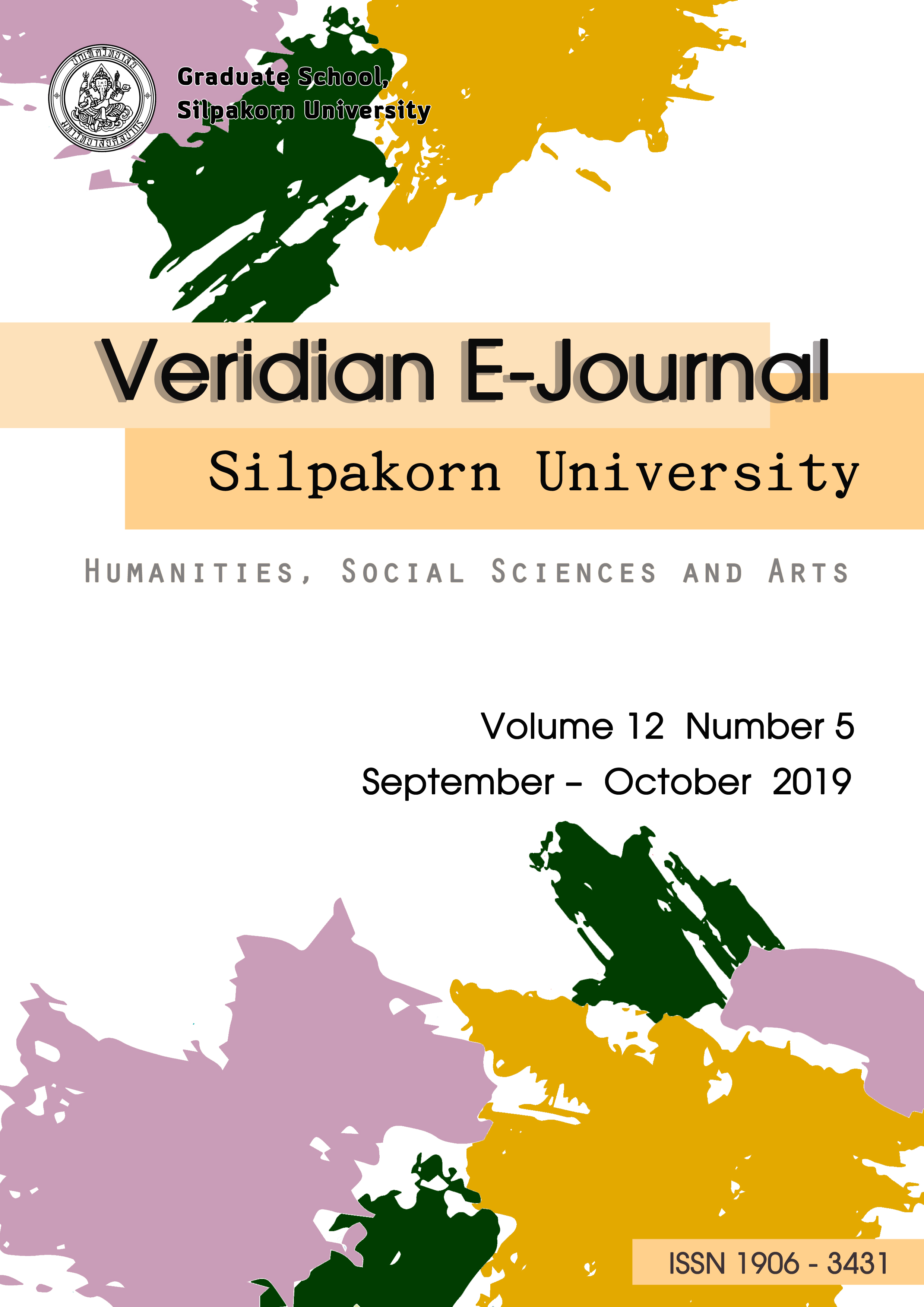แนวทางในการจัดการศึกษาเพื่อการสร้างความเป็นพลเมือง ของนักศึกษาระดับปริญญาตรี มหาวิทยาลัยศิลปากร(GUIDELINES OF EDUCATIONAL MANAGEMENT FOR CITIZENSHIP OF UNDERGRADUATE STUDENT, SILPAKORN UNIVERSITY)
Main Article Content
บทคัดย่อ
การวิจัยครั้งนี้มีวัตถุประสงค์ คือ 1) เพื่อศึกษาระดับการจัดการศึกษาเพื่อสร้างความเป็นพลเมือง และระดับความเป็นพลเมืองของนักศึกษาระดับปริญญาตรี มหาวิทยาลัยศิลปากร 2) เพื่อเปรียบเทียบระดับความเป็นพลเมืองของนักศึกษาระดับปริญญาตรี มหาวิทยาลัยศิลปากร จำแนกตามลักษณะส่วนบุคคล 3) เพื่อศึกษาปัจจัยที่ส่งผลต่อความเป็นพลเมืองของนักศึกษาระดับปริญญาตรี มหาวิทยาลัยศิลปากร 4) เพื่อศึกษาแนวทางในการจัดการศึกษาเพื่อการสร้างความเป็นพลเมืองของนักศึกษาระดับปริญญาตรี มหาวิทยาลัยศิลปากร กลุ่มตัวอย่างประกอบด้วย นักศึกษาระดับปริญญาตรี มหาวิทยาลัยศิลปากร ปีการศึกษา 2561 จำนวน 400 คน สุ่มตัวอย่างโดยใช้การสุ่มตัวอย่างแบบชั้นภูมิ และผู้ให้ข้อมูลหลักในการสัมภาษณ์ระดับลึก จำนวน 6 คน เครื่องมือที่ใช้ในการวิจัย 2 ส่วน คือ แบบสอบถามและแนวคำถามสำหรับการสัมภาษณ์ระดับลึก การวิเคราะห์ข้อมูลเชิงปริมาณ ใช้สถิติเชิงพรรณนา ประกอบด้วย ค่าความถี่ ค่าร้อยละ ค่าเฉลี่ย ค่าส่วนเบี่ยงเบนมาตรฐาน ค่าสถิติที การวิเคราะห์ความแปรปรวน การวิเคราะห์สหสัมพันธ์ และการวิเคราะห์การถดถอยพหุคูณ ส่วนการวิเคราะห์ข้อมูลเชิงคุณภาพจากการสัมภาษณ์ระดับลึก ใช้การวิเคราะห์เนื้อหา
ผลการวิจัยพบว่า 1) ระดับการจัดการศึกษาเพื่อสร้างความเป็นพลเมือง และระดับความเป็นพลเมืองของนักศึกษาระดับปริญญาตรี มหาวิทยาลัยศิลปากร โดยรวม อยู่ในระดับมาก และเมื่อพิจารณาเป็นรายด้าน พบว่า อยู่ในระดับมากทุกด้าน 2) ระดับความเป็นพลเมืองของนักศึกษาระดับปริญญาตรี มหาวิทยาลัยศิลปากร จำแนกตามลักษณะส่วนบุคคล พบว่า ช่วงอายุ ระดับชั้นปี กลุ่มสาขาวิชา และรายได้เฉลี่ยต่อเดือน ส่งผลต่อระดับความเป็นพลเมืองของนักศึกษาระดับปริญญาตรี มหาวิทยาลัยศิลปากร อย่างมีนัยสำคัญทางสถิติที่ระดับ 0.05 ส่วนเพศ ระดับเกรดเฉลี่ย และสถานที่พักอาศัย ส่งผลต่อระดับความเป็นพลเมืองของนักศึกษาระดับปริญญาตรี มหาวิทยาลัยศิลปากร อย่างไม่มีนัยสำคัญทางสถิติ 3) ปัจจัยที่ส่งผลต่อความเป็นพลเมืองของนักศึกษาระดับปริญญาตรี มหาวิทยาลัยศิลปากร พบว่า ปัจจัยด้านเนื้อหา และด้านการนำไปใช้ ส่งผลต่อการสร้างความเป็นพลเมืองของนักศึกษาระดับปริญญาตรี มหาวิทยาลัยศิลปากร อย่างมีนัยสำคัญทางสถิติที่ระดับ 0.05 ส่วนปัจจัยด้านการจัดการศึกษา ด้านการเรียนการสอน และด้านความเข้าใจ ส่งผลต่อการสร้างความเป็นพลเมืองของนักศึกษาระดับปริญญาตรี มหาวิทยาลัยศิลปากร อย่างไม่มีนัยสำคัญทางสถิติ 4) แนวทางในการจัดการศึกษาเพื่อการสร้างความเป็นพลเมืองของนักศึกษาระดับปริญญาตรี มหาวิทยาลัยศิลปากร เรื่อง “การเคารพกฎหมายและกติกาสังคม” คือ อาจารย์ต้องส่งเสริมให้นักศึกษาสามารถยอมรับในบรรทัดฐานที่สังคมกำหนดไว้ และเคารพกติกาที่ตกลงร่วมกันในสังคม มหาวิทยาลัยต้องมีการเตรียมความพร้อมทั้งทางด้านเนื้อหาในหลักสูตร ด้านการจัดการศึกษา รวมถึงด้านการเรียนการสอน และผู้บริหาร และอาจารย์ผู้สอนต้องมีวิสัยทัศน์ในการกำหนดมาตรการ ระเบียบขั้นตอน และติดตามผล เพื่อลดการผลิตบัณฑิตที่ไม่มีคุณภาพหรือไม่มีความรับผิดชอบต่อสังคม เรื่อง “การเคารพสิทธิเสรีภาพของตนเองและบุคคลอื่น” คือ อาจารย์ควรฝึกฝนให้นักศึกษามีคุณธรรม มีจริยธรรมในวิชาชีพ รู้จักเสียสละ และมีจิตอาสา ซึ่งนำไปสู่การเคารพสิทธิเสรีภาพของตนเองและบุคคลอื่น และผู้บริหารและอาจารย์ผู้สอนต้องสอนให้นักศึกษามีความรู้ ความเข้าใจ โดยอาจยกตัวอย่างจากประสบการณ์จริง เรื่อง “การมีเหตุผล รับฟังความคิดเห็นของผู้อื่น” คือ นักศึกษาควรมีการปลูกฝังในเรื่องของการมีความรับผิดชอบเรื่องเวลา รับผิดชอบในภาระงาน รับผิดชอบในหน้าที่ของตนเอง และการให้นักศึกษาได้แสดงความคิดสร้างสรรค์ ในการสร้างผลงานร่วมกันเป็นกลุ่ม โดยการให้นักศึกษามีส่วนร่วมโดยเฉพาะ เรื่อง “การมีความรับผิดชอบต่อตนเอง ชุมชน ประเทศชาติ และสังคมโลก” คือ อาจารย์ควรตระหนักให้นักศึกษาเป็นผู้ที่มีความรับผิดชอบต่อหน้าที่ของตนเอง และนึกถึงส่วนรวมมากกว่าส่วนตน คือ มหาวิทยาลัยควรมียุทธศาสตร์กลยุทธ์ โครงการ พัฒนานักศึกษาระดับปริญญาตรี คือ ผู้บริหารและอาจารย์ต้องทำให้นักศึกษาอยู่ด้วยตนเองได้อย่าง มีความสุข มีความรับผิดชอบต่อตนเองและสังคม ทำหน้าที่ของตนเองให้สำเร็จ และไม่เกิดปัญหา
The research objective of this study were 1) study level of educational management of citizenship and level of educational management of citizenship of undergraduate student, Silpakorn University. 2) compare level of educational management of citizenship of undergraduate student, Silpakorn University classified by personnel factors. 3) study factors affecting of citizenship of undergraduate student, Silpakorn University. 4) study guidelines of educational management of citizenship of undergraduate student, Silpakorn University. Samples from stratified sampling consisted of 400 undergraduate student, Silpakorn University, academic year 2018 and 6 teachers and administrators for in-depth interview. A questionnaire and in-depth interview guidelines ware contracted and use as tools to collect data. Data ware analyzed by using descriptive statistics, independent samples t-test, one-way analysis of variance, multiple regression analysis and content analysis.
The research results revealed that 1) Educational management level to create citizenship and citizenship levels of undergraduate students Silpakorn University is at a high level. And when considered in each aspect, found that it was at the high level in all aspects. 2) Citizenship level of undergraduate students Silpakorn University Classified by personal characteristics, found that age range, grade level, year group program And the average monthly income Affect the citizenship level of undergraduate students Silpakorn University Statistical significance at the level of 0.05, gender, average grade And accommodation Affect the citizenship level of undergraduate students Silpakorn University Without statistical significance. 3) Factors affecting citizenship of undergraduate students Silpakorn University found that content factors And the use side Effecting the citizenship building of undergraduate students Silpakorn University With statistical significance at the level of 0.05. In the aspect of educational management Teaching And understanding Effecting the citizenship building of undergraduate students Silpakorn University Without statistical significance. 4) Guidelines of educational management for citizenship building of undergraduate students Silpakorn University on "Respecting the Law and Social Rules" is Teachers must encourage students to accept the norms set by society. And respecting the rules agreed in society The university must prepare both the content of the course Educational Management Including teaching and learning, administrators and teachers must have a vision to set measures. Procedures and follow-up in order to reduce the production of graduates without quality or without social responsibility. The subject of "respect for the rights and freedoms of oneself and others" is that teachers should train students to be virtuous. Have professional ethics Knowing the sacrifice and volunteer spirit which leads to respect for the rights and freedom of oneself and others. And administrators and instructors must teach students knowledge and understanding, which may be based on real experience. "Reason to listen to the opinions of others" is that students should be cultivated in the responsibility of time. Responsible for workload Responsible for their duties And allowing students to show creativity In creating work together as a group By having students especially participate. The subject of "Responsibility to oneself, community, nation and world society" is that teachers should recognize that students are responsible for their duties. And think of the greater part than. That is, the university should have a strategic strategy for the undergraduate student development program, that is, administrators and professors must make students live on their own, happily responsible for themselves and society. Complete their duties And not a problem.

